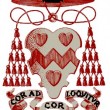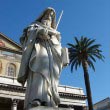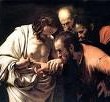Newman Newsletter 2014

Rome, June 2014
Dear Newman Friends,
As did his predecessors in the See of Peter, Pope Francis is showing his esteem for the works of Bl. John Henry Newman. In the first year of his pontificate,

Rome, June 2014
Dear Newman Friends,
As did his predecessors in the See of Peter, Pope Francis is showing his esteem for the works of Bl. John Henry Newman. In the first year of his pontificate,

Fr. Hermann Geissler, FSO
Pope Francis wishes the Church, in every part of the world, to become more missionary. In his Apostolic Exhortation, Evangelii gaudium, he addresses the faithful asking them “to embark upon a new chapter of evangelization” (n. 1). St. Paul, an apostle and a missionary, still remains a model for us today. For Blessed John Henry Newman Paul is the “glorious Apostle, this sweetest of inspired writers, this most touching and winning of teachers” towards whom he “ever felt a special

I adore you, O Lord, as is most fitting, for you are gone to heaven to take my part there and defend my interests. I have one to plead for me with the Lord of all. On earth we try to put ourselves under the protection of powerful men when we have any important business on hand; we know the value of their influence, and we make much of any promise they make us. You are omnipotent, and you exert your omnipotence for me.

Sermon 17 (7th May 1837)
“He shall glorify Me.” John 14. 14.
When our Lord was leaving His Apostles, and they were sorrowful, He consoled them by the promise of another Guide and Teacher, on whom they might rely instead of Him, and who should be more to them even than He had been. He promised them the Third Person in the Ever-blessed Trinity, the Holy Ghost, the Spirit of Himself and of His Father, who should come invisibly,
 Jesus, Redeemer of mankind, Have mercy on us.
Jesus, Redeemer of mankind, Have mercy on us.
Jesus, Conqueror of sin and Satan,
Jesus, triumphant over Death,
Jesus, the Holy and the Just,
Jesus, the Resurrection and the Life,
 Thomas says to Him, “My Lord and my God.”
Thomas says to Him, “My Lord and my God.”
1. I adore Thee, O my God, with Thomas; and if I have, like him, sinned through unbelief, I adore Thee the more. I adore Thee as the One Adorable, I adore Thee as more glorious in Thy humiliation, when men despised Thee, than when Angels worshipped Thee. Deus meus et omnia-“My God and my all.” To have Thee is to have everything I can have.
 O blessed day of the Resurrection, which of old time was called the Queen of Festivals, and raised among Christians an anxious, nay contentious diligence duly to honour it! Blessed day, once only passed in sorrow, when the Lord actually rose,
O blessed day of the Resurrection, which of old time was called the Queen of Festivals, and raised among Christians an anxious, nay contentious diligence duly to honour it! Blessed day, once only passed in sorrow, when the Lord actually rose,

6th May 1838
“A little while, and ye shall not see Me: and again, a little while, and ye shall see Me, because I go to the Father.” John 16:16.
Very opposite lessons are drawn in different parts of Scripture from the doctrine of Christ’s leaving the world and returning to His Father; lessons so opposite the one to the other, that at first sight a reader might even find a difficulty in reconciling them together. In an earlier season of His ministry, our

You are the Supreme Good. And, in saying so, I mean not only supreme goodness and benevolence, but that you are the sovereign and transcendent beautifulness. I believe that, beautiful as is your creation, it is mere dust and ashes, and of no account, compared with you, who are the infinitely more beautiful Creator. I know well
 It would be well if we were in the habit of looking at all we have as God’s gift, undeservedly given, and day by day continued to us solely by His mercy. He gave; He may take away. He gave us all we have, life, health, strength, reason, enjoyment, the light of conscience; whatever we have good and holy within us; whatever faith we have; whatever of a renewed will; whatever love towards Him; whatever power over ourselves; whatever prospect of heaven.
It would be well if we were in the habit of looking at all we have as God’s gift, undeservedly given, and day by day continued to us solely by His mercy. He gave; He may take away. He gave us all we have, life, health, strength, reason, enjoyment, the light of conscience; whatever we have good and holy within us; whatever faith we have; whatever of a renewed will; whatever love towards Him; whatever power over ourselves; whatever prospect of heaven.